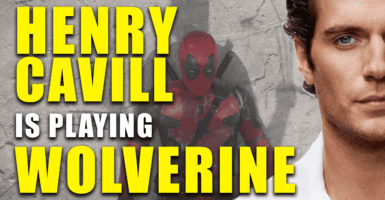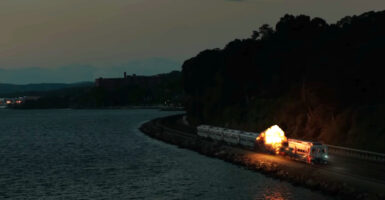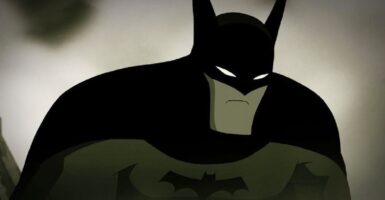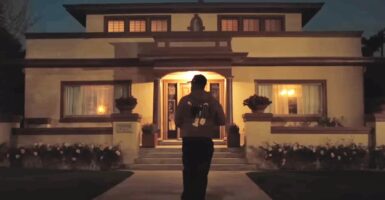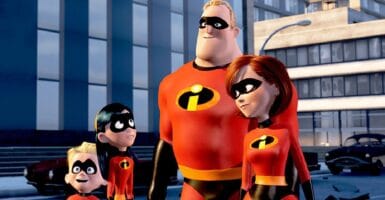Revolution Post-Game: “Sex and Drugs”
Charlie faces a difficult choice.
This article is more than 2 years old

Fans hoping for any big revelations in this week’s episode of Revolution were likely disappointed, but “Sex and Drugs” was a decent episode about how the blackout has changed once-decent people. The episode begins with Miles swiping a militia wagon and some horses so he can transport the knife-wounded Nora (Daniella Alonso) to the only place he can think of to get her medical treatment before the infection kills her. Given what we’ve learned about Miles’ (Billy Burke) background in the militia, the odds seemed good that this wasn’t going to be an entirely cordial meeting.
That certainly proves to be the case, because Miles’ old buddy — a criminal sleaze specializing in hookers and heroin — refuses to help Nora unless Miles sends Charlie (Tracy Spiridakos) to kill a local who keeps burning down the heroin crops. With Nora’s life hanging in the balance, we’re left to wonder if Charlie has what it takes to shove a blade into somebody’s eye socket to save the life of her friend.
As much as Charlie has been the show’s goody two-shoes so far, the loss of Danny (Graham Rogers) — for a second time — has clearly taken a toll on Charlie’s rose-tinted and hopeful view of the world. If she crosses that line, if she kills an innocent to save one of her own, that will unquestionable change her character on a fundamental level. Unfortunately, we don’t get to see how that awful choice would really play out, because Miles arrives at the last minute to save the day. Look, I’m not in favor of bloodthirstiness for its own sake, but so far Charlie remains the least interesting character on this show. If she actually had to live with a cold-blooded murder of expediency on her conscience, maybe she would have developed into a more compelling character. Instead we got the safe, cliched outcome — Miles to the rescue — and Charlie remains just the whiney one with improbably well-styled apocalypse hair.
Far more interesting than this are the flashbacks to Aaron Pitman’s (Zak Orth) life before and after the blackout. His character is an inherently interesting archetype: a man with no place in this new, more primitive world. A former Google executive, his skill set is rendered completely obsolete in the wake of the blackout. The flashbacks show us how useless he feels in the early days after the lights go out, to the point where he eventually abandons his wife to another group of survivors, leaving her a note that says she’ll be safer with them. Back in the “present,” however, Aaron shows that he both 1) is willing to potentially sacrifice his life to save another’s, and 2) when it is necessary, he doesn’t hesitate to put a bullet into the enemy. Pittman’s flashbacks are especially interesting when compared to the background of Captain Tom Neville (Giancarlo Esposito) from previous episodes; both are good, decent men, and both have been remade by the world of the blackout…Neville has just sunk far deeper into immorality and violence than Aaron has.
One thing I also really liked about this episode: when Aaron shot himself, I didn’t make the assumption that “Oh, he’s just faking.” I considered it as a possibility, but I also thought he might really be dead. On many shows, this situation would be almost a given that the Aaron would live to grow his beard another day. But with Eric Kripke in the driver’s seat, and with the death of Maggie (Anna Lise Phillips) still fresh in my mind, I actually won’t be surprised if most, if not all, of the characters prove to be expendable over the course of the show.
Finally, it’s worth noting some details from the “next week on Revolution promo. From the looks of things, we may get some big answers about the cause of the blackout. We once again see people fiddling with the mysterious, power-generating lockets, and we also hear talk of some sort of device or invention, suggesting again that the blackout was the result of human interference in some form. It’s looking less likely that solar storms or anything similar are at fault, although Kripke has freely admitted that the idea of storms knocking out the power grid was part of the inspiration for the series. The lockets suggest that we tried to play God and got bit for our trouble. It’s also worth noting that Kripke has said the visual representation of the lights going out in the opening credits is an accurate depiction of how it happened. That image has the blackout emanating from somewhere in the Northeastern United States and the spreading out in all directions. So I’m betting whatever caused it, it started up there.
